Over the weekend, Star Trek: The Next Generation actors Marina Sirtis, Denise Crosby, and Jonathan Frakes participated in a GalaxyCon virtual panel. As usual, the former co-stars showed off their chemistry and friendship with an entertaining chat, and also as usual, Marina Sirtis showed off her absolute candor. One instance of this regarded how TNG treated her character of Troi and other female characters.
Sirtis wishes she had offered writers suggestions for Troi
When discussing what kind of input they had on their characters, Frakes talked about bringing a love of jazz and his ability to play the trombone to Riker, and Denise Crosby talked about how she’s the one who pitched the creation of Sela, daughter of her original character Tasha Yar. Marina Sirtis jumped in to say she lamented not trying to inject more into her character, who she felt needed more development:
No [I didn’t suggest anything for Troi], they weren’t interested. I used to say to them, “What does Troi do in her spare time, apart from working out?” What does she do? What does she like? We know nothing about her. And they’d say to me, “What do you want to do?” And I would be like, “You’re the writer, come up with something!” Which is the lesson I learned on Star Trek. When they’re writing for seven characters and a bunch of guest stars every week, they welcome input from their regulars. Because they’ve just got so much to think about. So when they said that to me, I should have come up with something. If I ever get another series, I have learned my lesson. I will put my thinking cap on and help the writers, because they are just so swamped. 26 shows a year with 10 actors every week. It’s a lot of people.
Issues with writers not developing more female relationships
Crosby added to Sirtis’ lament, reminding her of a scene they both read during their audition process which showed an entire storyline that was never used for their characters:
There was a scene for [Marina’s and my] auditions that was a great scene that was never shot. It was a beautiful scene where [Troi] is Tasha’s friend, but also her therapist. And Tasha’s really struggling with feeling worthy, that she has a place on the ship. And she was idolizing – too much – Captain Picard… And [Troi] was like, “Take it down a notch, you are fine.” You got here on your own skills and talent. You very much deserve to be here. You need to have fun. Go to the holodeck, go out and have a drink. Get laid, practically. It was that kind of scene. It was just a really beautiful friendship. I never understood why that wasn’t a piece of the show. It not only showed what Counsellor Troi was about, her skill and why she was there, but also this side of Tasha which is very insecure and vulnerable.
All of this had Sirtis point at the lack of gender diversity in the TNG writers’ room:
We didn’t have a lot of just female [scenes], with women relating to each other. And that was probably because until Jeri [Taylor] came along… all the writers were men, apart from the occasional Melinda Snodgrass episode. So they didn’t write women’s relationships. It was sad, because women have more interesting relationships, I think, because we open up much more than man do.
Praise for series finale (mostly)
Sirtis did offer praise when asked for her thoughts on the script for the series finale “All Good Things,” contrasting it favorably with the script for the series premiere:
That was so good. That was good. That was [as different as] chalk and cheese from “Encounter at Farpoint,” so we say. That whole last episode was just so emotional, it’s just so emotional. Even though we knew in a week we were going to be starting work on [Star Trek:] Generations. It had everything, that episode. We actually shot the poker scene – it was the last thing and we shot it last – and we just fell apart at the end. Of course Michael Dorn who had been saying, “I can’t wait for the show to be over, I can’t stand this bloody makeup.” But as soon as they say that’s a wrap guys on TNG, he started blubbering like a baby and cried so hard his nose fell off. It just came right off. It was so special, wasn’t it Johnny? We just sat there holding hands. We didn’t move. We just sat there.
But after Denise began talking about returning for the finale, Sirits jumped back in with one nitpick for the finale:
I was dead in the future in “All Good Things,” wasn’t I? Well, that was bloody rubbish. I just remembered. [laughs]

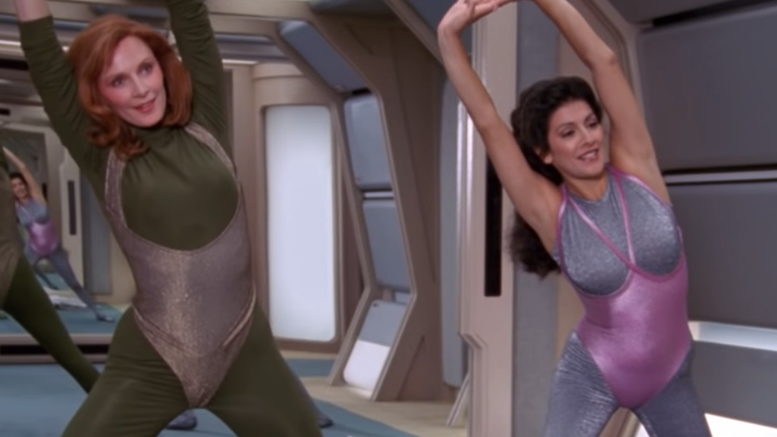


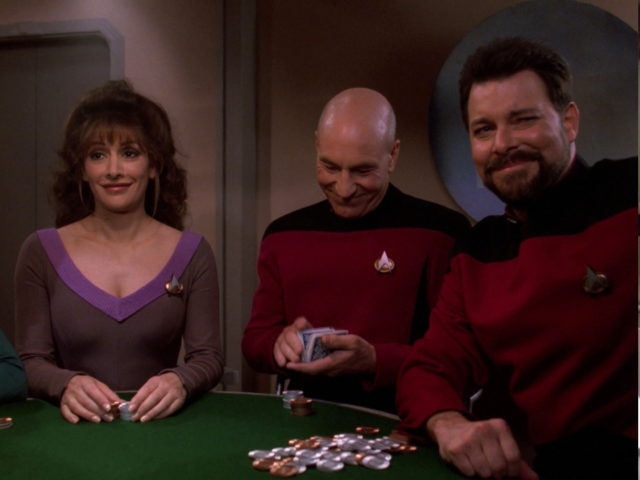
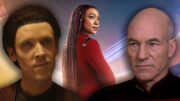
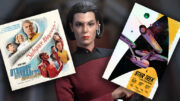
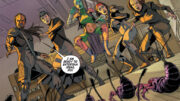
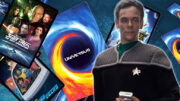
I don’t agree that the lack of character development had anything to do with gender. What did Geordi do in his spare time? Worf? Even Wesley wasn’t developed all that much, he was always “this week’s school project saves the day / threatens the ship”. Riker got more development, but he was second billing on the show, and even his role diminished as the popularity of Data and Worf soared.
Well, we know that Geordie loved to “pass time” on the holodeck.
Worf had a weird chair.
Thank you for remembering that chair!
I dunno, we knew a heck of a lot about Worf. We met his entire family and they always were in the context of developing him, with a son who became a recurring character multiple times a season, whereas Lwaxana showed up sporadically and often operated independently of her beleaguered daughter. And Worf had an ongoing story arc filled with nuance and backstory from Sins of the Father through Redemption, and he had more screen time than Troi in general, and that’s all before DS9.
Geordi I would agree was on par with Troi. He would be given stories that frequently could have been anyone’s, and his hapless romances were a tepid running gag. But he did at least have a good friendship dynamic with Data, whereas Troi and Crusher were not a featured duo nearly as much.
Much of Tori’s development centered around her relationships with Riker and then Worf, which is also not the best look. Her saving grace is that season 6/7 move to give her more career ambition.
Geordi had a best friend. They visited and broke the holodeck together. He built model ships, had failed romances and longed for “normal” vision. Growing up he was a Starfleet Brat. Picard highlighted how they met, and how he came to request Geordi on the Enterprise. We saw him interact with his previous crew and got to meet one of his best friends from the Victory – a ship he built a model of just prior to breaking the holodeck with his best friend.
Worf had a great deal of nuance beyond being the first of his species in Starfleet – he was a parent. He was adopted. He taught classes, killed holodeck monsters, fought the Klingon High Council in “court” and became one of the most developed characters in all of Trek.
Troi and Crusher both had episodes that highlighted their respective characters. But neither were developed as people. They were almost always an accessory to a male character. Their episode plot lines either centered on romance (where the male partner guest star was more featured than they were) or were simply on screen to support or bolster a male character’s story. They rarely if ever had conversations with each other that didn’t involve a male character. In fact the only one I can remember them having that didn’t involve a man involved the impact of metaphasic radiation on their breasts.
They were absolutely neglected by the male dominated writing staff. Pointing that out doesn’t take away from TNG’s successes. It was groundbreaking and Troi and Crusher were outstanding characters – but they were treated differently than their male counterparts and it’s nice to see how that improved as Trek evolved.
They weren’t the best at female characters back then. Though Geordi didn’t get a whole lot of development either.
Yar might have been interesting if she had stuck around when the show hired better writers in the later seasons.
Losing Yar really did change the show’s dynamics greatly. It left us with the only female characters on the show being caretaker-types. No wonder when Ro came along the writers salivated over ways she could shake things up.
Ro was the best female character they came up with. And I think she worked better showing up later. Sadly the character was severely underused and eventually abandoned. But she had the potential to bring some life to that dreary bridge. Really wishing she became a regular.
But then, we got something like that with Nerys. Who I heard a rumor was supposed to be Ro to begin with.
Ro was going to be in ds9 but ms Forbes didn’t want to do it so Kira was created.
Both characters help run the station in the novels.
I believe I mentioned Nerys was rumored to be Ro originally.
I get the sense that while Forbes was grateful to them for giving her exposure, she wanted to do a variety of roles, hence her barely being in TNG season 6 and 7. I don’t think I saw her take a role as a series regular for more than a year at a time until The Killing.
Shorter series episode count these days.
They’ve been saying this for decades, but I don’t see the connection between character development and hobbies.
I’ve never cared what any of them do in their spare time, unless it sheds a light on the character or their relationships (ex O’Brien and Bashir’s various escapades).
I’m also not a big fan of actor’s hobbies becoming character’s hobbies, generally.
That said, yes, they were lousy at writing for women.
You can tell a person by their passions, hobbies
Mr. Frakes seems to have slimmed down substantially. I trust he’s okay.
Yeah, I had the same thought. I’m hoping it’s just him intentionally getting back into shape in anticipation of future screen time.
I’m really glad Chabon made up for this in Picard with Troi’s episode. The moment where Troi first sees Picard and senses his brain condition and starts crying while a gentle smiling Picard tries to tell her he’s fine (but she really knows the truth because he can’t get anything by her) might be one of the most powerful moments of the TNG cast’s tenure.
The first time I saw Marina Sirtis as herself, I found her somewhat abrasive, but that lasted only for a few minutes, then I just realized that this woman has character… How great an actress she is to have portrayed Deana so well considering they are 0% similar. I exclude the first few episodes, where Sirtis could only do so much with what she was given.
I thought Troi’s hobby was chocolate. ;-)
Anyway, she did get at least one really good episode that I find myself going back to, one that had nothing to do with her falling in love or anything, and that was “Face of the Enemy.” Pity though it came late in the show’s run. Troi would’ve made a good spy or, if the story required, first contact specialist, rather than a space shrink.
Naren Shankar wrote “Face of the Enemy.”
Seeing what he’s done for female characters as the showrunner of the Expanse demonstrates that it it just took a guy who could look at Troi’s potential in a different way.
I finally saw that episode for the first time since it originally aired recently. And was unimpressed. It was really hard to buy Troi acting that way in that situation. It was sorta like watching Tilly masquerade as “Killy” in the MU. I just couldn’t buy it.
I did also see that Kestra episode, which I had completely forgotten about. And Troi actually wasn’t irritating or annoying in that one. It worked for her. I think it is pretty much the only Troi centered episode that does. And certainly it was easily the best of the Troi’s mom episodes. Which up to that point have always been complete garbage.
Well, that’s one reason I like the episode, because Troi is put in that position and struggles to maintain the act of a cold-hearted agent. But the main attraction for me is the performance of Carolyn Seymour as the commander.
Space Jazzercise – the exercise of the future!
I agree with Sirtis: All good things has everything. I’d go as far to say it encapsulates everything that was great in TNG, it’s entire essence even. It’s a flawless masterpiece imo.
It kinda does encapsulate the series. No real challenge. And Q holds Picard’s hand the entire time.
To be fair I have only seen it the one time back when it aired. But I’m in season 7 of my first rewatch since then. So it remains to be seen if my opinion of that episode will change. Some things in my rewatch did. I liked Pulaski much better this time around than I did the first time, for example.
The certainly improved by the time of DS9, nearly all the characters were Central to the main story arc.
TNG really was focused on Picard, Data and Worf as years went on, crusher and troi had their episodes here and there but no overarching story arc.
From my point of view DS9 benefitted greatly from TNG in that they learned from their mistakes. And in the end were able to make a much better show.
I do agree that more male characters were developed properly in the stories. However, we knew allot about Troi, her Mother and their background. But they could be better of course. Star Trek has always suffered from lack of the very excellent writers and many of the characters is almost 2D in their appearance but that was the deal back then and the reset button nature of the show. Now that TV shows has become high budget and prestigious among writers and actors, we get shows like Breaking Bad and The Crown where the characters really come to life (too bad they lack talent on Discovery). In summary, I don’t buy into the whole political/metoo/patriarchal angle especially when comparing the show to others from 1980-1990.
Honestly, Deanna and Beverly were perfectly balanced in the series. The thing that makes TNG so good is that balance. Sure, Data gets more than his fair share of episodes, but who really cares? TNG is better than all of the modern Trek combined. And Deanna did plenty in her spare time: Ate chocolate in ten forward, went to the holodeck with Worf and his son, studied to earn her commander rank, worked out with Beverly, played poker with the crew, went to conferences and symposiums, had a space baby, sensed stuff and ran to the bridge to warn the captain, escorted people from the twentieth century around the ship, etc.
If she had actually put that on her resumé, she’d probably have wolfed down an entire chocolate cake just to cope with the sadness.
Picard – Closed off / Private. Had a few relationships that never worked. Enjoyed breakfast with Beverly. Played a flute. Liked Archeology.
Riker – Played the trombone, parisi squares Spent 7 years trying to get back with Deanna but she was exercising or doing who knows
Deanna – Exercised, went for walks in the arboretum, teased Will, annoyed whenever her mom called.
Data: Painted. Tried sleeping, Dreaming, sex, and other human things. Let Geordi mess with his brain.
Geordi: Obsessed with Dr Leah Brahms, tried growing a beard for a bit. Often did experiments on data’s brain.
Beverly: Mom stuff until Wesley left. Then probably just sat around and worried about Wesley. Threw a few hints to Jean-Luc but he never got it. Exercised with Deanna.
Tasha Yar: Did it with Data then she died because of a big blob thing.
Katherine Pulaski: Who cares, crew couldn’t stand her. They were all glad she left. Especially Data whom Pulaski couldn’t be bothered to say his name right or treat him like a person.
Worf: Now here’s where we know the most of to be honest. knocked up Ambassador Kehlar, terrible father to Alexander. Hid behind the wooden horseshoe railing every time a Klingon appeared on screen. Had a pet targh, liked to fight holodeck characters. People annoyed him, he always Dwelled on his unfair dishonor because of his dad. When he broke his back he wanted to kill himself, he Liked Prune Juice. Tried unsuccessfully to get in Deanna’s pants. Only Klingon in Starfleet (cause Voyager hadn’t been created yet). He considered Riker his best friend.
“Katherine Pulaski: Who cares, crew couldn’t stand her. They were all glad she left.”
Maybe they should have had Dr. Pulaski fall down a turbo shaft.
LOL
To be fair, all the characters save perhaps Worf really had no character development. The women weren’t treated any worse than the men were in that regard.
Picard and Data were heavily developed.
No, Picard was the same person at the end of the 7 year run as he was at the beginning of it. And data… Well… Not sure how far a machine could progress. Perhaps there was a little more understanding but there really was no culmination of the character until Nemesis.
Completely disagree. Picard is absolutely not the same person in All Good Things… as he was in Encounter at Farpoint. He’s warmer, looser, more paternal, less guarded. And besides, character development is never solely measured in how much a character changes over time. Character personality, motivation and history are all part of development, and Data was given all of that in spades on top of a recurring exploration of his evolution and desire to self-improve and find humanity in himself. We know Picard and Data intimately as fleshed-out characters thanks to persistent and thoughtful character development. That’s what separates them from the Stamets, Mayweathers and Kims of the Trek universe.
That’s my verdict as well. I find I disagree with 95% of what Ml31 says. You can’t win them all I suppose.
It sounds like we saw two completely different shows. I’m in season 7 of my first rewatch of the show since it aired and I am certainly not seeing any development of Picard. With few exceptions, he is the same perfect character we saw at Farpoint. The one change I will give you is he is more comfortable around his staff. But that is quite typical for anyone who works with others over time. I don’t see that as any kind of character development. He is even the same person in the features. The only character that showed any kind of growth in the features was Data, ironically. And the only character that got any kind of growth in the series was Worf. I saw no one else grow or change or learn anything over the course of the series.
But to be fair, I’m not sure that was really the intent of the series to begin with. I don’t think anyone intended for the characters to really be all that deep. We really didn’t get that kind of production until DS9. TOS certainly didn’t do too much of that. There only Spock really grew and that was in very subtle ways that I think Nimoy added rather than from the writers and producers.
Again, character evolution over time is not the same as fleshing a character out, both constitute development. I still maintain he’s not the same, regardless of how “perfect” he still seems, one has only to see how he treated Wesley in season 1 to how he cares for him in seasons 2-7, or how he started to open up to Beverly and let in the possibility of becoming involved with her. That’s hardly the same as being more at ease with your staff, come on now.
He’s also not the same throughout the movies, and they offer real development as well. He confronts his mortality and legacy in Generations and his desire for revenge over what the Borg took from him in First Contact, all while embracing a more macho rebellious persona.
But more to the point of what constitutes real development, Picard is immeasurably more developed on the backs of episodes like Family, Tapestry, The Inner Light, Lessons, Chain of Command, Captain’s Holiday, and Samaritan Snare. We’ve seen his vulnerability, his fears, what drives him, his passion. That’s real character work. Fleshing out who a character is is the essence of character development, limiting one’s definition of character development only to growth is not the right way to approach it IMO.
Character background is not character development. Development is when a person grows and changes. How a person takes that journey is the key here. In the course of the series, there was no growth for JL Picard. As I said, becoming more comfortable around colleagues does not constitute character development. At least for me it doesn’t. Which is all Picard did. And I did allow for the closure with Crusher. But that in and of itself is really not enough. It didn’t change him. He didn’t grow from the experience. He learned nothing from it. All he did was open up to here some about it. Their relationship remained exactly was it was.
The one time he did not come across as an impossibly perfect character was in First Contact. Where he succumbed to revenge. Which can make for an interesting wrinkle in a good character, given what we saw of him in the series to sink to the level he did seems out of sorts. Still, I think it was a good thing to show that he wasn’t entirely perfect. It’s funny in that a friend of mine did not like First Contact for the very reason that Picard wasn’t perfect in it. He actually liked the fact that up to then Picard had no flaws. To each his own…
Of all the episodes you mentioned none of them really left any lasting effects as far as I could tell. He buried those experiences deep and ignored them as best he could. At least, the ones where there was something to bury. The one that should have had a true lasting effect was The Inner Light. But in ensuing episodes we really didn’t see an effect of living an entire lifetime might have had on a person. But I think it must be said that even in the early 90’s the idea of characters holding on to things from episode to episode was indeed a little rare. Not that it didn’t happen. In most cases such things only reared its head when it was needed to for some future story. Otherwise the person usually was the same person the following week.
None of those Picard episodes is simply “background,” that’s so reductive, as is the contention that character development can only be defined as how a character demonstrably changes demeanor or behavior or way of thinking.
“Family” is deeply insightful into who Picard is as a character. It’s pivotal to understanding his psyche and how the Borg broke it down. I have no idea how anyone can look at that episode and his breakdown with Robert as anything but meaningful character development. Add on that every time the Borg show up again (save perhaps for “Descent”) Picard is visibly affected to the point of uncontrollable rage, and if call that sustained and major character work and development, and it even highlights the imperfections in him you are so keen to find, in “Family,” in “I, Borg” and in First Contact.
And you mention “The Inner Light” as not having an effect on him, as if we the audience needs that kind of stuff spoon fed to us via Picard radically changing. The character development is in how we see this standoffish, uptight, driven, rational man finally able to leave his career behind, fall in love, have and love children and grandchildren. Our insight into who Picard is changed because of “The Inner Light.” That affects how we see him in “Lessons,” in “Bloodlines,” in “All Good Things…” in “Generations.” I don’t need to see him start staring into space and hugging his flute every few weeks from season 6 on to see he’s been meaningfully fleshed out as a character on the back of that episode. My understanding of who he is as a character has been expanded by that episode and all the others I mentioned, to name but a few. That is true character development.
I really just do not think I can understand this POV of needing characters to show flaws and to demonstrate change over time to be the only qualifications for character development. I think that’s so myopic and limited, it can only lead to rampant disappointment in many a beloved character across all entertainment. I do hope you find a way to reevaluate your criteria.
It took me an embarrassingly long amount of time to realize “All Good Things” is TNG’s take on A Christmas Carol, showing us a Picard who is regretful he hasn’t appreciated the people around him more. To me that suggests that Stewart and the writers wished, in retrospect, they had been able to change his character more over the course of the series, but then they were hamstrung somewhat by the episodic/status quo storytelling. Oh well, it is what it was.
I’ll try to keep that in mind when I get to AGT some time in the future. I’m through 10 episodes in season 7 now. I was going to say that Tapestry was more Christmas Carol but I think it is more It’s a Wonderful Life.
Anyone know why crusher was sidelined throughout the TNG movies?
Probably because she ended up not being a major character and it was difficult to come up with ways to include her in a meaningful fashion. Worf was pretty much Sulu in the TNG features as well.
She is Jean luc’s oldest friend and he went through a lot in the films.
You telling me there was no time for her to even talk to him about it?
And she should have got the same spotlight as bones did, seeing as she is chief medical officer
Was she, though? It was difficult to determine that in the series. All they really did was have the occasional meal together. That was about it. There was that one episode that explored their past in the 7th season that explained why he was so distant to her. But them going through “a lot”? I just didn’t see it. And I’m part way through season 7 of my rewatch.
When you say “talk to her about it” what are you referring to?
And no, she does not get the same treatment Bones did as McCoy was a MAJOR character and a VERY important influence on Kirk. I got the impression Jim knew Leonard from before he was even given command of the Enterprise. There was a subtext there that just never existed on TNG.
She knew j p for years before coming aboard 1701-d and he brought back her husband after his death.
Quite a few episodes centered around their relationship
I am already aware of the back story between Picard and Crusher. It wasn’t used all that much. And again, only one episode really dove into the relationship. That was it.
Not true, their past relationship, because of her late husband, was arc throughout the series
Same reason as Sulu and Uhura were for most of the TOS films. Just not enough screen time to go around, especially if Picard, Data and Riker always needed to lead a storyline. Troi was a John Logan favorite so she got more time in Nemesis… but it was only so she could get mind raped again. Not sure we can call that a win. But I certainly think they could have tried harder for Crusher.
She should have reacted to seeing shinzon as she knows what j p looked like back at the academy.
And she should have talked to j p about it.
I think she was used to help Worf lock phasers on the Scimitar. One of the very few times her empathic abilities had a real positive function.
That was troi not crusher
I know. Ian was talking about Troi and I added that.
Troi helping find the Scimitar was a silly scene with that cheesy dramatic lighting done to highlight her eyes. It was part of a derivative and problematic mind rape storyline in the middle of an Undiscovered Country redux space battle. For as much as he proclaimed to love her, John Logan did her no favors. Her Voyager romps were fine, but in the grand scheme of things they point most to Sirtis just never saying no whenever she is asked to come back, regardless of how good the material is. It was certainly not good for “Inside Man” or “These Are the Voyages.” Fortunately, she got one stellar outing in Picard, one of the best use of Troi and Sirtis’ acting skills I can remember.
Using link to Shinzon to locate the ship was a good use of the incident. Regardless of your feeling towards the “mind rape”, which you are correct. We have seen before. But I would argue in this instance it was handled a little better than it was in the series. Further, we’ve seen a Data duplicate before too. And again, was handled much better in Nemesis than it was in the series. The case can be made that Logan liked the character so he finally gave her something pivotal to do. Up to that point, she was a pretty worthless character. Someone who never should have been a regular. Ought to have been a recurring character at best. Only show up when the situation needed.
I will also agree that Sirtis never met a Troi appearance she didn’t like. She and Frakes have both milked Trek more than anyone else. And every one of her appearances were worthless. Including the one in Picard. She really added nothing to the episode or the overall storyline. It felt more like fan service than anything else.
Okay, I would not go that far.
TNG had created a stronger ensemble than OS with everyone given episodes to themselves, something the movies couldn’t do.
Vs TOS, the TNG ensemble was stronger on the back of the tv series for sure, we never really got Uhura or Sulu or Chekov episodes. That said, The Voyage Home is the closest any film TMP-Nem ever got to feeling like an ensemble affair where the whole cast got a nice little piece of the action (and of course Sulu’s special scene was cut due to unfortunate circumstances). On balance, I’d say Uhura has by far the least to do in the films, which is a waste.
And Crusher has the least to do in the TNG films. You are quite right to point out she is Picard’s oldest friend on the ship (barring Guinan, I suppose) and that could have carried over into scenes in First Contact (though as an outsider, Lily does work as a good foil) and Nemesis. Their romantic tension is completely ignored in the films just as Worf and Troi’s is only there if you know to look for it when Worf half-heartedly encourages Riker to go for it in Insurrection.
Thank Jellicoe for ordering her into standard uniform.
That picture from ‘Farpoint’ has Tasha in a skort. I don’t remember that. Was that in the episode or is this a test shot of some sort?
Lack of character development is one of the reasons I wish TNG had not gone away or probably rather it had come back before Picard. We could have seen a lot more of these characters instead of wasting time on the useless reboot movies. Even most of the TNG movies were a waste.
The movies were good for troi and sirtis.
but not for the Enterprise-D and -E